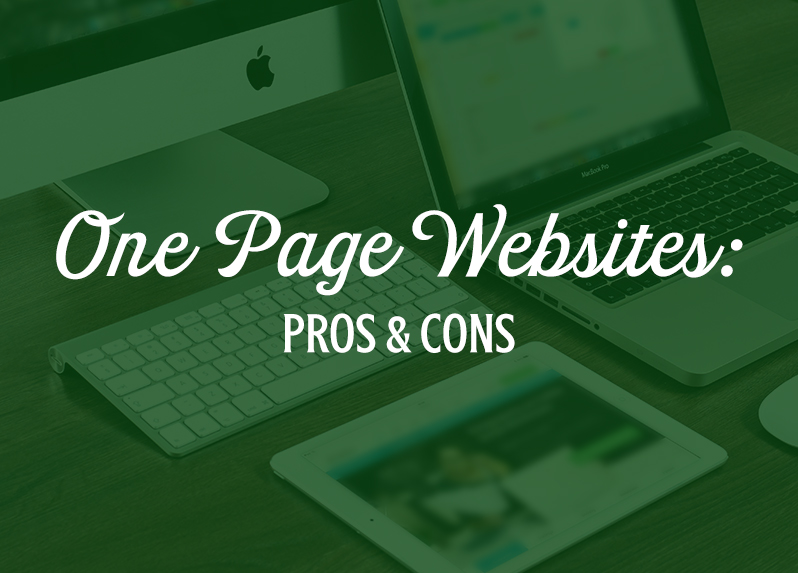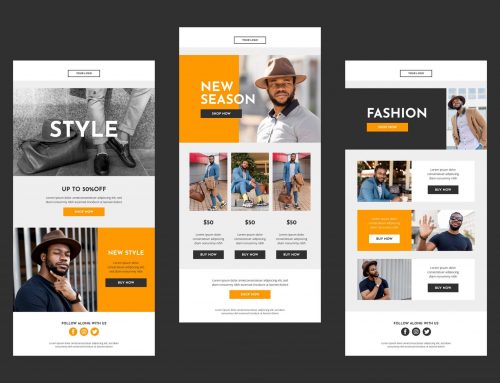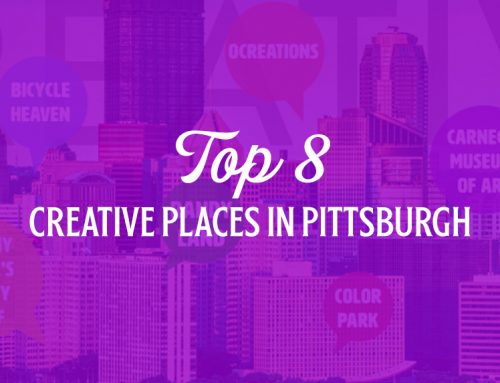ONE PAGE WEBSITES: PROS & CONS
We’ve given you tips on websites, and we’ve given you tips on simple landing pages before a site goes live. Well, we’ve got some tips on something in between: one page websites. As with many other digital platforms, one page websites certainly have their advantages, as well as their disadvantages. Before deciding to make your site one page, it’s important to understand if this type of site will be good for your business, or if you will require a full multi-page site. However, a one page site may be perfectly adequate for your business, or could serve as a segue between your landing page and a fully developed multi-page site. But first things first, before we make any decisions just yet, let’s look at the pros and cons.
PROS OF A ONE PAGE WEBSITE:
One-page websites provide numerous beneficial features:
Boosts user engagement
Because one page sites are… one page… it creates a higher engagement rate for users. A one page site will deliver messages and calls-to-action to users quickly. Users are only engaging with one page, which makes it easier to interact with the calls-to-action you present on your site. They don’t have to look far to find a contact form, or buttons that link to your social media, because they’re all in the same place. Additionally, because our attention spans have grown smaller and smaller, it increases your chances of a user staying on your site longer since they only have to scroll down one page, versus trying to fish through pages, subpages, etc.
Simplicity makes for easy navigation
The power of simplicity plays a large role on one page sites. Because of the simplicity of these pages, it makes user experience very easy. Users will not get lost like they might on a multi-page site, which leaves risk of users clicking deeper and deeper into page after page of a complex site. Many one-page sites typically have a menu at the top of the page (if the page is lengthy or has multiple parts) to make it even easier for users to jump directly down to the portion of the page they desire to look at.
More mobile-friendly
As any website should have responsive design, a one page site is no exception. When designing for mobile, users tend to have a better user experience when they only have to view one page, even if they have to scroll. Think about any of the social media platforms you use on your phone, where you scroll on one single page to view content. A one page site is just the same! No worrying about hopping around from page to page. Everything is all in one place for you to view content.
A One Page Website Works well with images
Because all your content is on a singular page, it gives you the opportunity to place a variety of high-quality photos onto it, and give your site visual appeal. It also provides the opportunity to boost your site’s SEO. Correctly-named images can potentially improve your ranking in search results on Google.
More affordable to build and maintain
Though there may be some extra time and effort into the strategy behind the layout of a single page website, overall, it is going to be more affordable to build and maintain. A one page site may only take 10-15 hours to design and build, whereas a multi-page site could take triple the amount. If your brand is in a hurry to create a website, a more complex site may not be your solution (at least right away). A one page site is going to be more affordable, and always has the opportunity to be expanded upon later.
One page sites are also easier to maintain. If something needs fixed, adjusted, added, or removed, it’s all on one page. This is especially handy for website owners that don’t consider themselves fluent in web design. For instance, if you use WordPress as your web platform, you’ll only have one page (with multiple buckets/sections) with the capability of editing. If you work with a developer, they should be able to show you how to maintain your website once it goes live.
Higher conversion rates
Because all of your site traffic is going to one place, one page sites typically have higher conversion rates.
CONS OF A ONE PAGE WEBSITE:
Just as there are a multitude of advantages to one page website design, there are a few drawbacks as well. It’s important to understand both sides to know how you should move forward with your own website.
Difficulty with SEO: Analytics
One tool that can aid in a website’s success is Google Analytics. It allows you to see what pages visitors tend to gravitate towards, or pages where users lose interest easily, etc. Because one page designs only have one page to analyze, there is no way to compare it to any other page on your website (because you don’t have any others). Understanding what content on your site is performing well versus what could be improved upon proves more difficult with a one page site.
Difficulty with SEO: Keyword Targeting
It can also be a challenge to incorporate all of the keywords you wish to include on a singular page. On a single-page website, you will definitely be limited to how many keywords you can target. If you choose to saturate your one page site with tons of keywords (which we do not recommend), it will be very obvious, and your content will not read as naturally as you would want it to.
Additionally, one page sites also limit your SEO potential in terms of producing a substantial amount of content, and rank above your competitors in SERPs.
UX May Be Confusing
Sure, a one page design may look and work similarly to an app in the sense that users can scroll up and down on a singular page. However, many people are used to the experience of a multi-page web design. They already understand how to navigate a well-organized multi-page site, so a one page site may cause confusion if a user is expecting the site to break off into other pages and they are not able to find any additional pages.
Might take longer to load
If you are trying to cram in a lot of content onto a single page, and your one page site is filled with a ton of photos, videos, links, and copy, it may weigh down your website in the backend. This could result in slower loading time. Again, as humans we are less patient than we’ve ever been. If we have to wait longer than anticipated to let a website fully load, we may get frustrated and leave the website. Additionally, sites that have a particularly slow loading time may also see negative outcomes in Google rankings.
Limited Scalability
Once a single page website is complete, you may be asking yourself “how do I add more content?” In short, you don’t have many options. One option is to replace existing content, to make sure the length of the page is the same. Another option is to cram the information in, which will result in a very long page causing users to have to scroll a lot more. Or, finally, you can opt to expand your site into a multi-page site.
A one page website requires a lot of scrolling
Yes, a one page site is typically going to require a user to scroll more than he or she would on a multi-page site. If you need to include a multitude of sections filled with a large amount of copy that keeps users scrolling for a long time, it may make your users become frustrated or bored during their user experience. However, if your content is interesting enough, this may not be as much of a concern. If you are concerned about the amount of scrolling, add a menu at the top of your page that will jump down to a particular section of your page, so users don’t have to scroll as much, yet are still confined to view content on a single page.
Sharing content on a one page website may pose difficulties
As social media becomes increasingly popular, users have shared more content than ever. If someone comes across an interesting article or fascinating video, they will likely share that link onto their profile. Since a single page website only has one URL, it can make sharing a specific piece of content from that page more difficult. If someone finds an interesting piece of content on a one page site, when they go to share it, they will share the entirety of the one page website.
So, what kind of website should I build?
The answer truly depends on your business and your brand. Take a close look at who your target audience is, and what your goals are for your online presence (and for your brand as a whole). Also strategically think about how you may need to organize and display your content to best reach your target audience. At the end of the day, multi-page websites are going to be more beneficial, especially if you want your site to rank well with SEO. However, in certain specific cases you may only need a one page site (at least to get started). Now that you understand the pros and cons of a one page website, you’ll be able to determine if it is the right choice for your brand’s online presence.
Thinking about a one page web design for your brand, or need a website but not sure where to begin? Contact us at ocreations. We have experience in designing landing pages, one page sites, simple sites, and even more complex sites. Let’s get digital, let’s get creative.







